Architecture
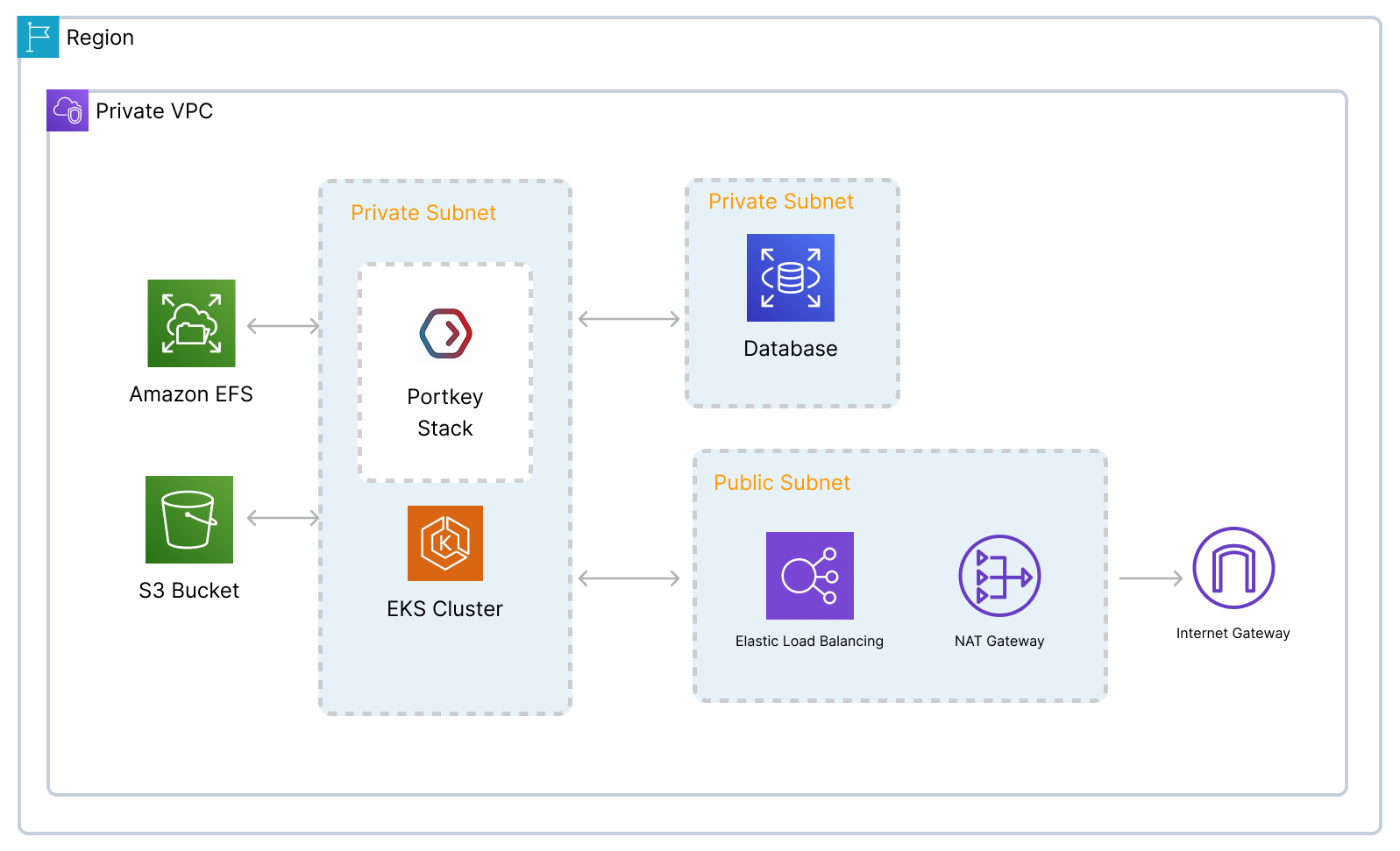
Components and Sizing Recommendations
| Component | Options | Sizing Recommendations |
|---|---|---|
| AI Gateway | Deploy as a Docker container in your Kubernetes cluster using Helm Charts | AWS NodeGroup t4g.medium instance, with at least 4GiB of memory and two vCPUs For high reliability, deploy across multiple Availability Zones. |
| Logs store | AWS S3 | Each log document is ~10kb in size (uncompressed) |
| Cache (Prompts, Configs & Virtual Keys) | Elasticache or self-hosted Redis | Deploy in the same VPC as the Portkey Gateway. |
Helm Chart
This deployment uses the Portkey AI hybrid Helm chart to deploy the Portkey AI Gateway. You can find more information about the Helm chart in the Portkey AI Helm Chart GitHub Repository.Prerequisites
- Create a Portkey account on Portkey AI
- Portkey team will share the credentials for the private Docker registry.
Markeplace Listing
Visit Portkey AI AWS Marketplace Listing
You can find the Portkey AI AWS Marketplace listing here.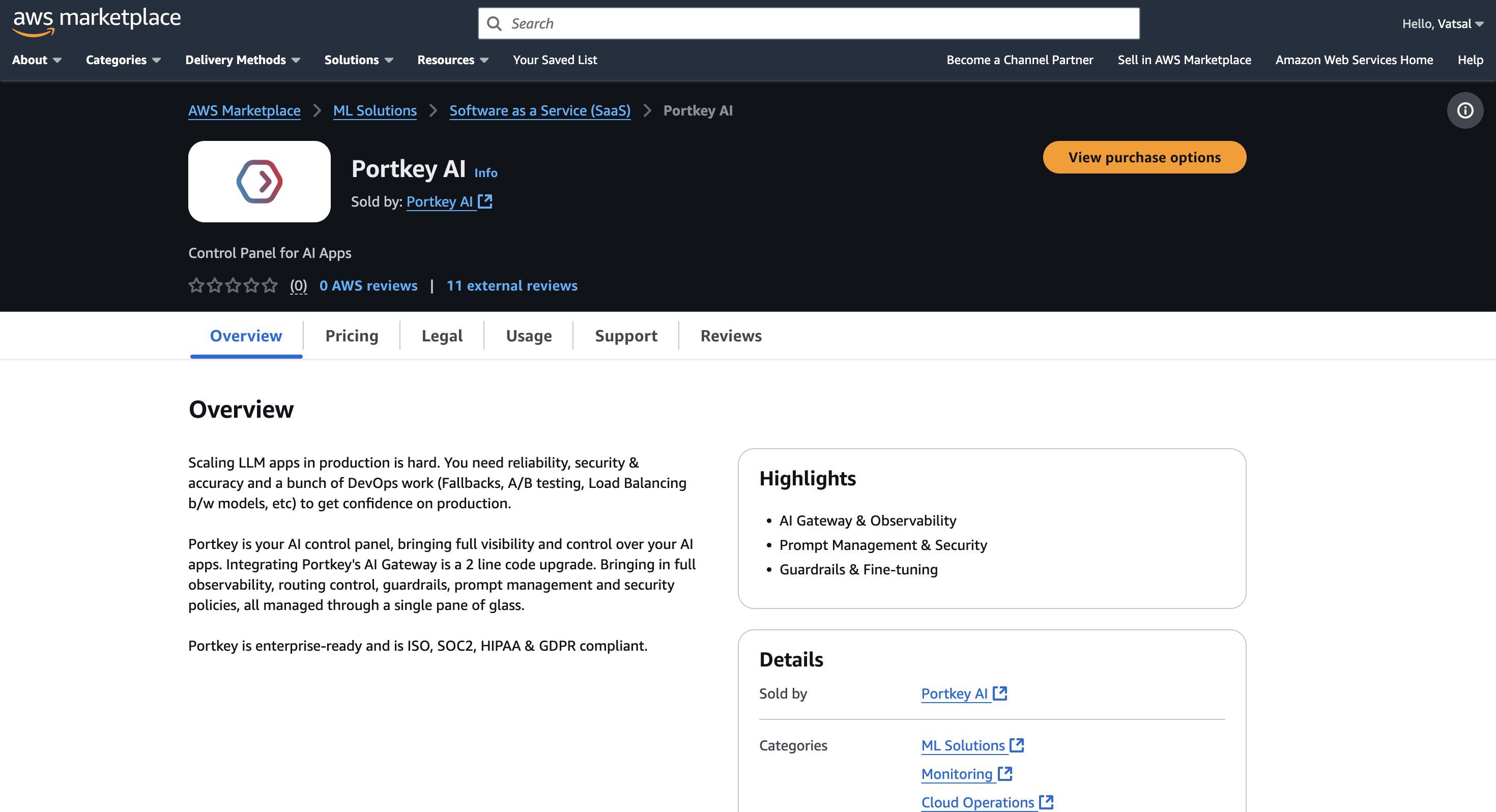
Subscribe to Portkey AI Enterprise Edition
Subscribe to the Portkey AI Enterprise Edition to gain access to the Portkey AI Gateway.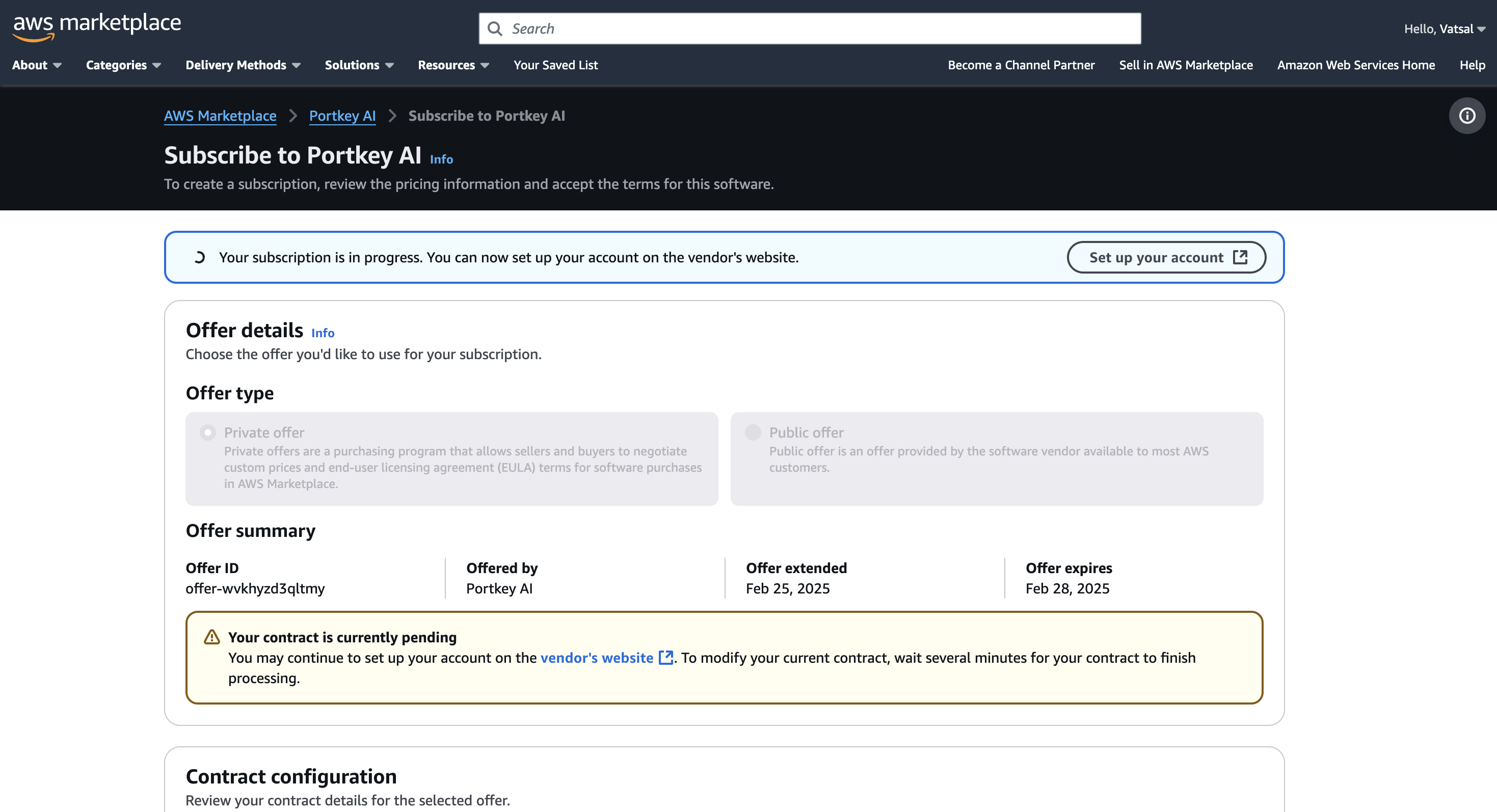
Quick Launch
Upon subscribing to the Portkey AI Enterprise Edition, you will be able to select Quick Launch from within your AWS Console Subscriptions.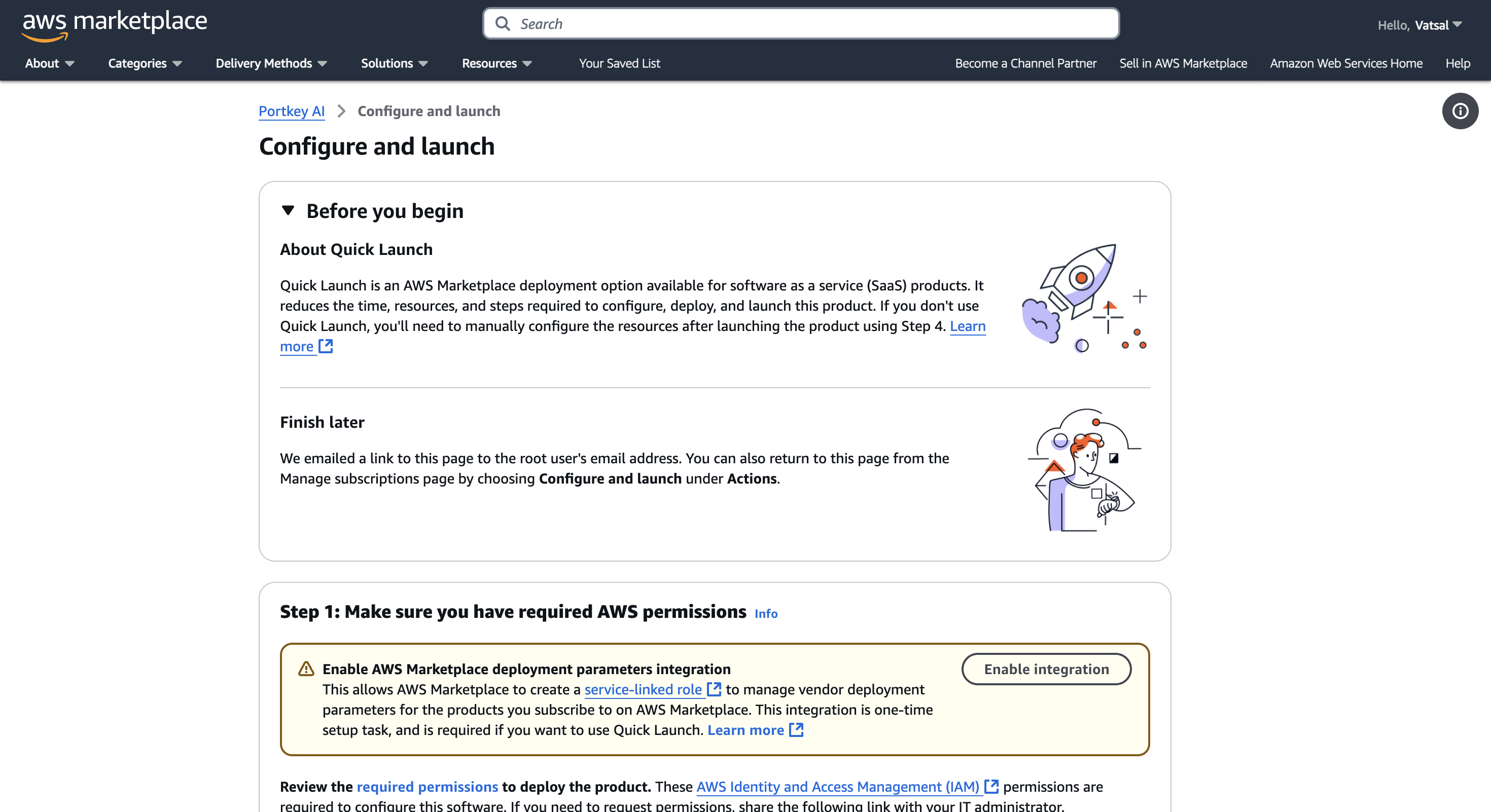
Launch the Cloud Formation Template
Select the Portkey AI Enterprise Edition and click on Quick Launch.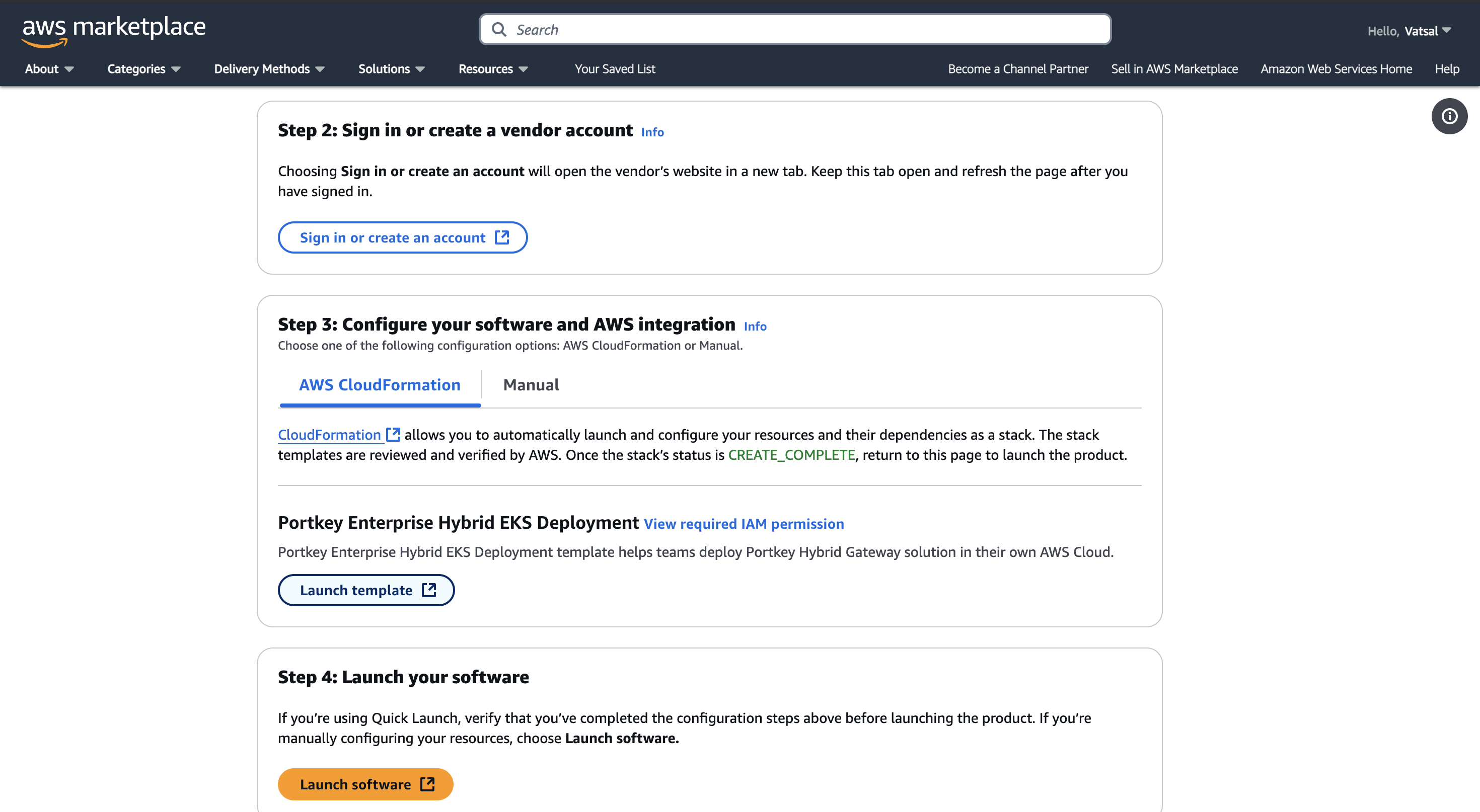
Run the Cloud Formation Template
Fill the required parameters and click on Next and run the Cloud Formation Template.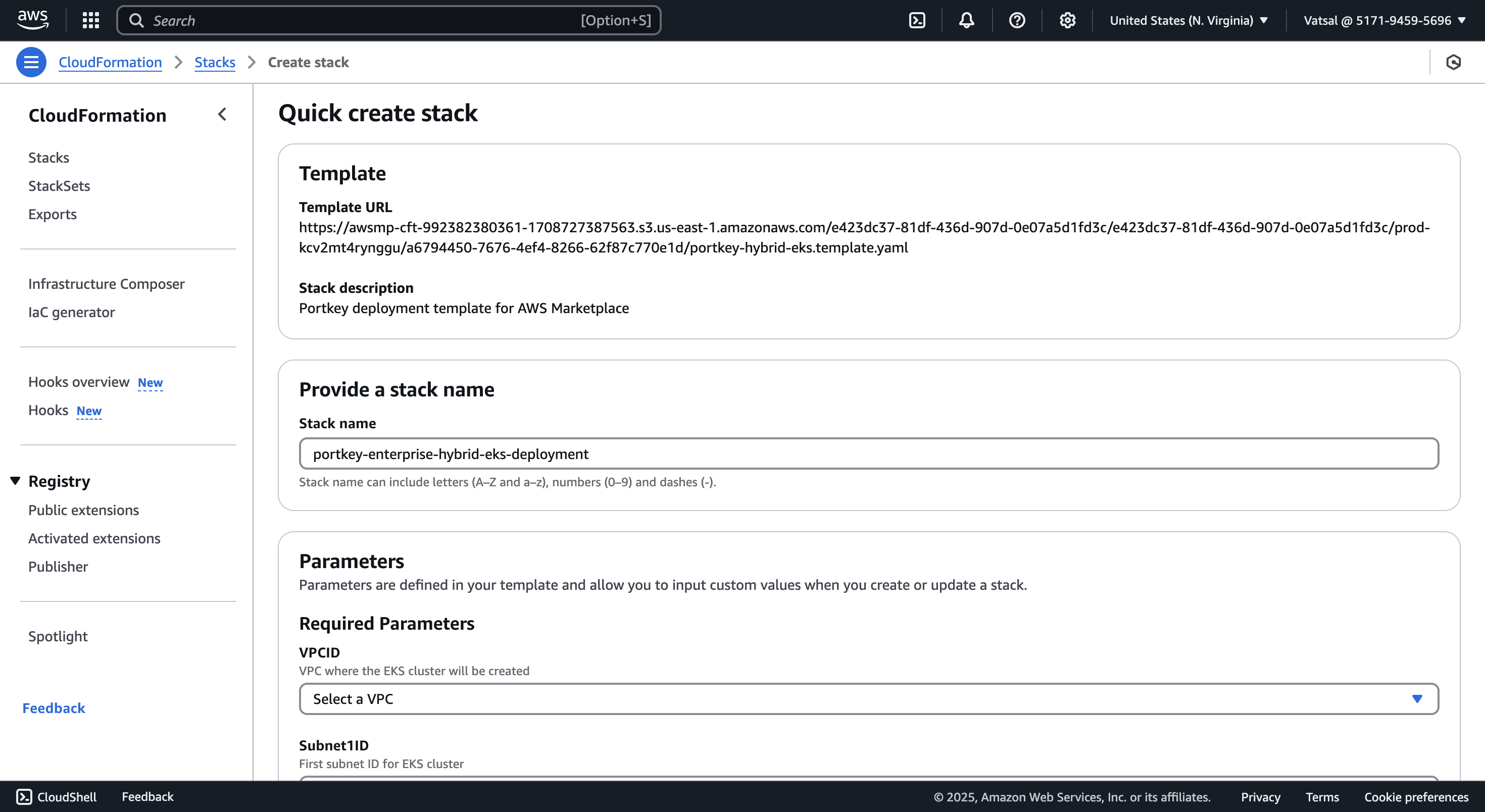
Cloud Formation Steps
- Creates a new EKS cluster and NodeGroup in your selected VPC and Subnets
- Sets up IAM Roles needed for S3 bucket access using STS and Lambda execution
- Uses AWS Lambda to:
- Install the Portkey AI Helm chart to your EKS cluster
- Upload the values.yaml file to the S3 bucket
- Allows for changes to the values file or helm chart deployment by updating and re-running the same Lambda function in your AWS account
Cloudformation Template
Our cloudformation template has passed the AWS Marketplace validation and security review.
portkey-hybrid-eks-cloudformation.template.yaml
Copy
Ask AI
AWSTemplateFormatVersion: "2010-09-09"
Description: Portkey deployment template for AWS Marketplace
Metadata:
AWS::CloudFormation::Interface:
ParameterGroups:
- Label:
default: "Required Parameters"
Parameters:
- VPCID
- Subnet1ID
- Subnet2ID
- ClusterName
- NodeGroupName
- NodeGroupInstanceType
- SecurityGroupID
- CreateNewCluster
- HelmChartVersion
- PortkeyDockerUsername:
NoEcho: true
- PortkeyDockerPassword:
NoEcho: true
- PortkeyClientAuth:
NoEcho: true
- Label:
default: "Optional Parameters"
Parameters:
- PortkeyOrgId
- PortkeyGatewayIngressEnabled
- PortkeyGatewayIngressSubdomain
- PortkeyFineTuningEnabled
Parameters:
# Required Parameters
VPCID:
Type: AWS::EC2::VPC::Id
Description: VPC where the EKS cluster will be created
Default: Select a VPC
Subnet1ID:
Type: AWS::EC2::Subnet::Id
Description: First subnet ID for EKS cluster
Default: Select your subnet
Subnet2ID:
Type: AWS::EC2::Subnet::Id
Description: Second subnet ID for EKS cluster
Default: Select your subnet
# Optional Parameters with defaults
ClusterName:
Type: String
Description: Name of the EKS cluster (if not provided, a new EKS cluster will be created)
Default: portkey-eks-cluster
NodeGroupName:
Type: String
Description: Name of the EKS node group (if not provided, a new EKS node group will be created)
Default: portkey-eks-cluster-node-group
NodeGroupInstanceType:
Type: String
Description: EC2 instance type for the node group (if not provided, t3.medium will be used)
Default: t3.medium
AllowedValues:
- t3.medium
- t3.large
- t3.xlarge
PortkeyDockerUsername:
Type: String
Description: Docker username for Portkey (provided by the Portkey team)
Default: portkeyenterprise
PortkeyDockerPassword:
Type: String
Description: Docker password for Portkey (provided by the Portkey team)
Default: ""
NoEcho: true
PortkeyClientAuth:
Type: String
Description: Portkey Client ID (provided by the Portkey team)
Default: ""
NoEcho: true
PortkeyOrgId:
Type: String
Description: Portkey Organisation ID (provided by the Portkey team)
Default: ""
HelmChartVersion:
Type: String
Description: Version of the Helm chart to deploy
Default: "latest"
AllowedValues:
- latest
SecurityGroupID:
Type: String
Description: Optional security group ID for the EKS cluster (if not provided, a new security group will be created)
Default: ""
CreateNewCluster:
Type: String
AllowedValues: [true, false]
Default: true
Description: Whether to create a new EKS cluster or use an existing one
PortkeyGatewayIngressEnabled:
Type: String
AllowedValues: [true, false]
Default: false
Description: Whether to enable the Portkey Gateway ingress
PortkeyGatewayIngressSubdomain:
Type: String
Description: Subdomain for the Portkey Gateway ingress
Default: ""
PortkeyFineTuningEnabled:
Type: String
AllowedValues: [true, false]
Default: false
Description: Whether to enable the Portkey Fine Tuning
Conditions:
CreateSecurityGroup: !Equals [!Ref SecurityGroupID, ""]
ShouldCreateCluster: !Equals [!Ref CreateNewCluster, true]
Resources:
PortkeyAM:
Type: AWS::IAM::Role
DeletionPolicy: Delete
Properties:
RoleName: PortkeyAM
AssumeRolePolicyDocument:
Version: "2012-10-17"
Statement:
- Effect: Allow
Principal:
AWS: !Sub "arn:aws:iam::${AWS::AccountId}:root"
Action: sts:AssumeRole
Policies:
- PolicyName: PortkeyEKSAccess
PolicyDocument:
Version: "2012-10-17"
Statement:
- Effect: Allow
Action:
- "eks:DescribeCluster"
- "eks:ListClusters"
- "eks:ListNodegroups"
- "eks:ListFargateProfiles"
- "eks:ListNodegroups"
- "eks:CreateCluster"
- "eks:CreateNodegroup"
- "eks:DeleteCluster"
- "eks:DeleteNodegroup"
- "eks:UpdateClusterConfig"
- "eks:UpdateKubeconfig"
Resource: !Sub "arn:aws:eks:${AWS::Region}:${AWS::AccountId}:cluster/${ClusterName}"
- Effect: Allow
Action:
- "sts:AssumeRole"
Resource: !Sub "arn:aws:iam::${AWS::AccountId}:role/PortkeyAM"
- Effect: Allow
Action:
- "sts:GetCallerIdentity"
Resource: "*"
- Effect: Allow
Action:
- "iam:ListRoles"
- "iam:GetRole"
Resource: "*"
- Effect: Allow
Action:
- "bedrock:InvokeModel"
- "bedrock:InvokeModelWithResponseStream"
Resource: "*"
- Effect: Allow
Action:
- "s3:GetObject"
- "s3:PutObject"
Resource:
- !Sub "arn:aws:s3:::${AWS::AccountId}-${AWS::Region}-portkey-logs/*"
PortkeyLogsBucket:
Type: AWS::S3::Bucket
DeletionPolicy: Delete
Properties:
BucketName: !Sub "${AWS::AccountId}-${AWS::Region}-portkey-logs"
VersioningConfiguration:
Status: Enabled
PublicAccessBlockConfiguration:
BlockPublicAcls: true
BlockPublicPolicy: true
IgnorePublicAcls: true
RestrictPublicBuckets: true
BucketEncryption:
ServerSideEncryptionConfiguration:
- ServerSideEncryptionByDefault:
SSEAlgorithm: AES256
# EKS Cluster Role
EksClusterRole:
Type: AWS::IAM::Role
DeletionPolicy: Delete
Properties:
RoleName: EksClusterRole-Portkey
AssumeRolePolicyDocument:
Version: "2012-10-17"
Statement:
- Effect: Allow
Principal:
Service: eks.amazonaws.com
Action: sts:AssumeRole
ManagedPolicyArns:
- arn:aws:iam::aws:policy/AmazonEKSClusterPolicy
# EKS Cluster Security Group (if not provided)
EksSecurityGroup:
Type: AWS::EC2::SecurityGroup
Condition: CreateSecurityGroup
DeletionPolicy: Delete
Properties:
GroupDescription: Security group for Portkey EKS cluster
VpcId: !Ref VPCID
SecurityGroupIngress:
- IpProtocol: tcp
FromPort: 8787
ToPort: 8787
CidrIp: PORTKEY_IP
SecurityGroupEgress:
- IpProtocol: tcp
FromPort: 443
ToPort: 443
CidrIp: 0.0.0.0/0
# EKS Cluster
EksCluster:
Type: AWS::EKS::Cluster
Condition: ShouldCreateCluster
DeletionPolicy: Delete
DependsOn: EksClusterRole
Properties:
Name: !Ref ClusterName
Version: "1.32"
RoleArn: !GetAtt EksClusterRole.Arn
ResourcesVpcConfig:
SecurityGroupIds:
- !If
- CreateSecurityGroup
- !Ref EksSecurityGroup
- !Ref SecurityGroupID
SubnetIds:
- !Ref Subnet1ID
- !Ref Subnet2ID
AccessConfig:
AuthenticationMode: API_AND_CONFIG_MAP
LambdaExecutionRole:
Type: AWS::IAM::Role
DeletionPolicy: Delete
DependsOn: EksCluster
Properties:
RoleName: PortkeyLambdaRole
AssumeRolePolicyDocument:
Version: "2012-10-17"
Statement:
- Effect: Allow
Principal:
Service: lambda.amazonaws.com
Action: sts:AssumeRole
ManagedPolicyArns:
- arn:aws:iam::aws:policy/service-role/AWSLambdaBasicExecutionRole
Policies:
- PolicyName: EKSAccess
PolicyDocument:
Version: "2012-10-17"
Statement:
- Effect: Allow
Action:
- ec2:DescribeInstances
- ec2:DescribeRegions
Resource: "*"
- Effect: Allow
Action:
- "sts:AssumeRole"
Resource: !GetAtt PortkeyAM.Arn
- Effect: Allow
Action:
- "s3:GetObject"
- "s3:PutObject"
Resource:
- !Sub "arn:aws:s3:::${AWS::AccountId}-${AWS::Region}-portkey-logs/*"
- Effect: Allow
Action:
- "eks:DescribeCluster"
- "eks:ListClusters"
- "eks:ListNodegroups"
- "eks:ListFargateProfiles"
- "eks:ListNodegroups"
- "eks:CreateCluster"
- "eks:CreateNodegroup"
- "eks:DeleteCluster"
- "eks:DeleteNodegroup"
- "eks:CreateFargateProfile"
- "eks:DeleteFargateProfile"
- "eks:DescribeFargateProfile"
- "eks:UpdateClusterConfig"
- "eks:UpdateKubeconfig"
Resource: !Sub "arn:aws:eks:${AWS::Region}:${AWS::AccountId}:cluster/${ClusterName}"
LambdaClusterAdmin:
Type: AWS::EKS::AccessEntry
DependsOn: EksCluster
Properties:
ClusterName: !Ref ClusterName
PrincipalArn: !GetAtt LambdaExecutionRole.Arn
Type: STANDARD
KubernetesGroups:
- system:masters
AccessPolicies:
- PolicyArn: "arn:aws:eks::aws:cluster-access-policy/AmazonEKSClusterAdminPolicy"
AccessScope:
Type: "cluster"
# Node Group Role
NodeGroupRole:
Type: AWS::IAM::Role
DeletionPolicy: Delete
Properties:
RoleName: NodeGroupRole-Portkey
AssumeRolePolicyDocument:
Version: "2012-10-17"
Statement:
- Effect: Allow
Principal:
Service: ec2.amazonaws.com
Action: sts:AssumeRole
ManagedPolicyArns:
- arn:aws:iam::aws:policy/AmazonEKSWorkerNodePolicy
- arn:aws:iam::aws:policy/AmazonEKS_CNI_Policy
- arn:aws:iam::aws:policy/AmazonEC2ContainerRegistryReadOnly
# EKS Node Group
EksNodeGroup:
Type: AWS::EKS::Nodegroup
DependsOn: EksCluster
DeletionPolicy: Delete
Properties:
CapacityType: ON_DEMAND
ClusterName: !Ref ClusterName
NodegroupName: !Ref NodeGroupName
NodeRole: !GetAtt NodeGroupRole.Arn
InstanceTypes:
- !Ref NodeGroupInstanceType
ScalingConfig:
MinSize: 1
DesiredSize: 1
MaxSize: 1
Subnets:
- !Ref Subnet1ID
- !Ref Subnet2ID
PortkeyInstallerFunction:
Type: AWS::Lambda::Function
DependsOn: EksNodeGroup
DeletionPolicy: Delete
Properties:
FunctionName: portkey-eks-installer
Runtime: nodejs18.x
Handler: index.handler
MemorySize: 1024
EphemeralStorage:
Size: 1024
Code:
ZipFile: |
const fs = require('fs');
const zlib = require('zlib');
const { pipeline } = require('stream');
const path = require('path');
const https = require('https');
const { promisify } = require('util');
const { execSync } = require('child_process');
const { EKSClient, DescribeClusterCommand } = require('@aws-sdk/client-eks');
async function unzipAwsCli(zipPath, destPath) {
// ZIP file format: https://en.wikipedia.org/wiki/ZIP_(file_format)
const data = fs.readFileSync(zipPath);
let offset = 0;
// Find end of central directory record
const EOCD_SIGNATURE = 0x06054b50;
for (let i = data.length - 22; i >= 0; i--) {
if (data.readUInt32LE(i) === EOCD_SIGNATURE) {
offset = i;
break;
}
}
// Read central directory info
const numEntries = data.readUInt16LE(offset + 10);
let centralDirOffset = data.readUInt32LE(offset + 16);
// Process each file
for (let i = 0; i < numEntries; i++) {
// Read central directory header
const signature = data.readUInt32LE(centralDirOffset);
if (signature !== 0x02014b50) {
throw new Error('Invalid central directory header');
}
const fileNameLength = data.readUInt16LE(centralDirOffset + 28);
const extraFieldLength = data.readUInt16LE(centralDirOffset + 30);
const fileCommentLength = data.readUInt16LE(centralDirOffset + 32);
const localHeaderOffset = data.readUInt32LE(centralDirOffset + 42);
// Get filename
const fileName = data.slice(
centralDirOffset + 46,
centralDirOffset + 46 + fileNameLength
).toString();
// Read local file header
const localSignature = data.readUInt32LE(localHeaderOffset);
if (localSignature !== 0x04034b50) {
throw new Error('Invalid local file header');
}
const localFileNameLength = data.readUInt16LE(localHeaderOffset + 26);
const localExtraFieldLength = data.readUInt16LE(localHeaderOffset + 28);
// Get file data
const fileDataOffset = localHeaderOffset + 30 + localFileNameLength + localExtraFieldLength;
const compressedSize = data.readUInt32LE(centralDirOffset + 20);
const uncompressedSize = data.readUInt32LE(centralDirOffset + 24);
const compressionMethod = data.readUInt16LE(centralDirOffset + 10);
// Create directory if needed
const fullPath = path.join(destPath, fileName);
const directory = path.dirname(fullPath);
if (!fs.existsSync(directory)) {
fs.mkdirSync(directory, { recursive: true });
}
// Extract file
if (!fileName.endsWith('/')) { // Skip directories
const fileData = data.slice(fileDataOffset, fileDataOffset + compressedSize);
if (compressionMethod === 0) { // Stored (no compression)
fs.writeFileSync(fullPath, fileData);
} else if (compressionMethod === 8) { // Deflate
const inflated = require('zlib').inflateRawSync(fileData);
fs.writeFileSync(fullPath, inflated);
} else {
throw new Error(`Unsupported compression method: ${compressionMethod}`);
}
}
// Move to next entry
centralDirOffset += 46 + fileNameLength + extraFieldLength + fileCommentLength;
}
}
async function extractTarGz(source, destination) {
// First, let's decompress the .gz file
const gunzip = promisify(zlib.gunzip);
console.log('Reading source file...');
const compressedData = fs.readFileSync(source);
console.log('Decompressing...');
const tarData = await gunzip(compressedData);
// Now we have the raw tar data
// Tar files are made up of 512-byte blocks
let position = 0;
while (position < tarData.length) {
// Read header block
const header = tarData.slice(position, position + 512);
position += 512;
// Get filename from header (first 100 bytes)
const filename = header.slice(0, 100)
.toString('utf8')
.replace(/\0/g, '')
.trim();
if (!filename) break; // End of tar
// Get file size from header (bytes 124-136)
const sizeStr = header.slice(124, 136)
.toString('utf8')
.replace(/\0/g, '')
.trim();
const size = parseInt(sizeStr, 8); // Size is in octal
console.log(`Found file: ${filename} (${size} bytes)`);
if (filename === 'linux-amd64/helm') {
console.log('Found helm binary, extracting...');
// Extract the file content
const content = tarData.slice(position, position + size);
// Write to destination
const outputPath = path.join(destination, 'helm');
fs.writeFileSync(outputPath, content);
console.log(`Helm binary extracted to: ${outputPath}`);
return; // We found what we needed
}
// Move to next file
position += size;
// Move to next 512-byte boundary
position += (512 - (size % 512)) % 512;
}
throw new Error('Helm binary not found in archive');
}
async function downloadFile(url, dest) {
return new Promise((resolve, reject) => {
const file = fs.createWriteStream(dest);
https.get(url, (response) => {
response.pipe(file);
file.on('finish', () => {
file.close();
resolve();
});
}).on('error', reject);
});
}
async function setupBinaries() {
const { STSClient, GetCallerIdentityCommand, AssumeRoleCommand } = require("@aws-sdk/client-sts");
const { SignatureV4 } = require("@aws-sdk/signature-v4");
const { defaultProvider } = require("@aws-sdk/credential-provider-node");
const crypto = require('crypto');
const tmpDir = '/tmp/bin';
if (!fs.existsSync(tmpDir)) {
fs.mkdirSync(tmpDir, { recursive: true });
}
console.log('Setting up AWS CLI...');
const awsCliUrl = 'https://awscli.amazonaws.com/awscli-exe-linux-x86_64.zip';
const awsZipPath = `${tmpDir}/awscliv2.zip`;
await unzipAwsCli(awsZipPath, tmpDir);
execSync(`chmod +x ${tmpDir}/aws/install ${tmpDir}/aws/dist/aws`);
execSync(`${tmpDir}/aws/install --update --install-dir /tmp/aws-cli --bin-dir /tmp/aws-bin`, { stdio: 'inherit' });
try {
await new Promise((resolve, reject) => {
const https = require('https');
const fs = require('fs');
const file = fs.createWriteStream('/tmp/kubectl');
const request = https.get('https://dl.k8s.io/release/v1.32.1/bin/linux/amd64/kubectl', response => {
if (response.statusCode === 302 || response.statusCode === 301) {
https.get(response.headers.location, redirectResponse => {
redirectResponse.pipe(file);
file.on('finish', () => {
file.close();
resolve();
});
}).on('error', err => {
fs.unlink('/tmp/kubectl', () => {});
reject(err);
});
return;
}
response.pipe(file);
file.on('finish', () => {
file.close();
resolve();
});
});
request.on('error', err => {
fs.unlink('/tmp/kubectl', () => {});
reject(err);
});
});
execSync('chmod +x /tmp/kubectl', {
stdio: 'inherit'
});
} catch (error) {
console.error('Error installing kubectl:', error);
throw error;
}
console.log('Setting up helm...');
const helmUrl = 'https://get.helm.sh/helm-v3.12.0-linux-amd64.tar.gz';
const helmTarPath = `${tmpDir}/helm.tar.gz`;
await downloadFile(helmUrl, helmTarPath);
await extractTarGz(helmTarPath, tmpDir);
execSync(`chmod +x ${tmpDir}/helm`);
fs.unlinkSync(helmTarPath);
process.env.PATH = `${tmpDir}:${process.env.PATH}`;
execSync(`/tmp/aws-bin/aws --version`);
}
exports.handler = async (event, context) => {
try {
const { CLUSTER_NAME, NODE_GROUP_NAME, CLUSTER_ARN, CHART_VERSION,
PORTKEY_AWS_REGION, PORTKEY_AWS_ACCOUNT_ID, PORTKEYAM_ROLE_ARN,
PORTKEY_DOCKER_USERNAME, PORTKEY_DOCKER_PASSWORD,
PORTKEY_CLIENT_AUTH, ORGANISATIONS_TO_SYNC } = process.env;
console.log(process.env)
if (!CLUSTER_NAME || !PORTKEY_AWS_REGION || !CHART_VERSION ||
!PORTKEY_AWS_ACCOUNT_ID || !PORTKEYAM_ROLE_ARN) {
throw new Error('Missing one or more required environment variables.');
}
await setupBinaries();
const awsCredentialsDir = '/tmp/.aws';
if (!fs.existsSync(awsCredentialsDir)) {
fs.mkdirSync(awsCredentialsDir, { recursive: true });
}
// Write AWS credentials file
const credentialsContent = `[default]
aws_access_key_id = ${process.env.AWS_ACCESS_KEY_ID}
aws_secret_access_key = ${process.env.AWS_SECRET_ACCESS_KEY}
aws_session_token = ${process.env.AWS_SESSION_TOKEN}
region = ${process.env.PORTKEY_AWS_REGION}
`;
fs.writeFileSync(`${awsCredentialsDir}/credentials`, credentialsContent);
// Write AWS config file
const configContent = `[default]
region = ${process.env.PORTKEY_AWS_REGION}
output = json
`;
fs.writeFileSync(`${awsCredentialsDir}/config`, configContent);
// Set AWS config environment variables
process.env.AWS_CONFIG_FILE = `${awsCredentialsDir}/config`;
process.env.AWS_SHARED_CREDENTIALS_FILE = `${awsCredentialsDir}/credentials`;
// Define kubeconfig path
const kubeconfigDir = `/tmp/${CLUSTER_NAME.trim()}`;
const kubeconfigPath = path.join(kubeconfigDir, 'config');
// Create the directory if it doesn't exist
if (!fs.existsSync(kubeconfigDir)) {
fs.mkdirSync(kubeconfigDir, { recursive: true });
}
console.log(`Updating kubeconfig for cluster: ${CLUSTER_NAME}`);
execSync(`/tmp/aws-bin/aws eks update-kubeconfig --name ${process.env.CLUSTER_NAME} --region ${process.env.PORTKEY_AWS_REGION} --kubeconfig ${kubeconfigPath}`, {
stdio: 'inherit',
env: {
...process.env,
HOME: '/tmp',
AWS_CONFIG_FILE: `${awsCredentialsDir}/config`,
AWS_SHARED_CREDENTIALS_FILE: `${awsCredentialsDir}/credentials`
}
});
// Set KUBECONFIG environment variable
process.env.KUBECONFIG = kubeconfigPath;
let kubeconfig = fs.readFileSync(kubeconfigPath, 'utf8');
// Replace the command line to use full path
kubeconfig = kubeconfig.replace(
'command: aws',
'command: /tmp/aws-bin/aws'
);
fs.writeFileSync(kubeconfigPath, kubeconfig);
// Setup Helm repository
console.log('Setting up Helm repository...');
await new Promise((resolve, reject) => {
try {
execSync(`helm repo add portkey-ai https://portkey-ai.github.io/helm`, {
stdio: 'inherit',
env: { ...process.env, HOME: '/tmp' }
});
resolve();
} catch (error) {
reject(error);
}
});
await new Promise((resolve, reject) => {
try {
execSync(`helm repo update`, {
stdio: 'inherit',
env: { ...process.env, HOME: '/tmp' }
});
resolve();
} catch (error) {
reject(error);
}
});
// Create values.yaml
const valuesYAML = `
replicaCount: 1
images:
gatewayImage:
repository: "docker.io/portkeyai/gateway_enterprise"
pullPolicy: IfNotPresent
tag: "1.9.0"
dataserviceImage:
repository: "docker.io/portkeyai/data-service"
pullPolicy: IfNotPresent
tag: "1.0.2"
imagePullSecrets: [portkeyenterpriseregistrycredentials]
nameOverride: ""
fullnameOverride: ""
imageCredentials:
- name: portkeyenterpriseregistrycredentials
create: true
registry: https://index.docker.io/v1/
username: ${PORTKEY_DOCKER_USERNAME}
password: ${PORTKEY_DOCKER_PASSWORD}
useVaultInjection: false
environment:
create: true
secret: true
data:
SERVICE_NAME: portkeyenterprise
PORT: "8787"
LOG_STORE: s3_assume
LOG_STORE_REGION: ${PORTKEY_AWS_REGION}
AWS_ROLE_ARN: ${PORTKEYAM_ROLE_ARN}
LOG_STORE_GENERATIONS_BUCKET: portkey-gateway
ANALYTICS_STORE: control_plane
CACHE_STORE: redis
REDIS_URL: redis://redis:6379
REDIS_TLS_ENABLED: "false"
PORTKEY_CLIENT_AUTH: ${PORTKEY_CLIENT_AUTH}
ORGANISATIONS_TO_SYNC: ${ORGANISATIONS_TO_SYNC}
serviceAccount:
create: true
automount: true
annotations: {}
name: ""
podAnnotations: {}
podLabels: {}
podSecurityContext: {}
securityContext: {}
service:
type: LoadBalancer
port: 8787
targetPort: 8787
protocol: TCP
additionalLabels: {}
annotations: {}
ingress:
enabled: ${PORTKEY_GATEWAY_INGRESS_ENABLED}
className: ""
annotations: {}
hosts:
- host: ${PORTKEY_GATEWAY_INGRESS_SUBDOMAIN}
paths:
- path: /
pathType: ImplementationSpecific
tls: []
resources: {}
livenessProbe:
httpGet:
path: /v1/health
port: 8787
initialDelaySeconds: 30
periodSeconds: 60
timeoutSeconds: 5
failureThreshold: 5
readinessProbe:
httpGet:
path: /v1/health
port: 8787
initialDelaySeconds: 30
periodSeconds: 60
timeoutSeconds: 5
successThreshold: 1
failureThreshold: 5
autoscaling:
enabled: true
minReplicas: 1
maxReplicas: 10
targetCPUUtilizationPercentage: 80
volumes: []
volumeMounts: []
nodeSelector: {}
tolerations: []
affinity: {}
autoRestart: false
dataservice:
name: "dataservice"
enabled: ${PORTKEY_FINE_TUNING_ENABLED}
containerPort: 8081
finetuneBucket: ${PORTKEY_AWS_ACCOUNT_ID}-${PORTKEY_AWS_REGION}-portkey-logs
logexportsBucket: ${PORTKEY_AWS_ACCOUNT_ID}-${PORTKEY_AWS_REGION}-portkey-logs
deployment:
autoRestart: true
replicas: 1
labels: {}
annotations: {}
podSecurityContext: {}
securityContext: {}
resources: {}
startupProbe:
httpGet:
path: /health
port: 8081
initialDelaySeconds: 60
failureThreshold: 3
periodSeconds: 10
timeoutSeconds: 1
livenessProbe:
httpGet:
path: /health
port: 8081
failureThreshold: 3
periodSeconds: 10
timeoutSeconds: 1
readinessProbe:
httpGet:
path: /health
port: 8081
failureThreshold: 3
periodSeconds: 10
timeoutSeconds: 1
extraContainerConfig: {}
nodeSelector: {}
tolerations: []
affinity: {}
volumes: []
volumeMounts: []
service:
type: ClusterIP
port: 8081
labels: {}
annotations: {}
loadBalancerSourceRanges: []
loadBalancerIP: ""
serviceAccount:
create: true
name: ""
labels: {}
annotations: {}
autoscaling:
enabled: false
createHpa: false
minReplicas: 1
maxReplicas: 5
targetCPUUtilizationPercentage: 80`
// Write values.yaml
const valuesYamlPath = '/tmp/values.yaml';
fs.writeFileSync(valuesYamlPath, valuesYAML);
const { S3Client, PutObjectCommand, GetObjectCommand } = require("@aws-sdk/client-s3");
const s3Client = new S3Client({ region: process.env.PORTKEY_AWS_REGION });
try {
const response = await s3Client.send(new GetObjectCommand({
Bucket: `${process.env.PORTKEY_AWS_ACCOUNT_ID}-${process.env.PORTKEY_AWS_REGION}-portkey-logs`,
Key: 'values.yaml'
}));
const existingValuesYAML = await response.Body.transformToString();
console.log('Found existing values.yaml in S3, using it instead of default');
fs.writeFileSync(valuesYamlPath, existingValuesYAML);
} catch (error) {
if (error.name === 'NoSuchKey') {
// Upload the default values.yaml to S3
await s3Client.send(new PutObjectCommand({
Bucket: `${process.env.PORTKEY_AWS_ACCOUNT_ID}-${process.env.PORTKEY_AWS_REGION}-portkey-logs`,
Key: 'values.yaml',
Body: valuesYAML,
ContentType: 'text/yaml'
}));
console.log('Default values.yaml written to S3 bucket');
} else {
throw error;
}
}
// Install/upgrade Helm chart
console.log('Installing helm chart...');
await new Promise((resolve, reject) => {
try {
execSync(`helm upgrade --install portkey-ai portkey-ai/gateway -f ${valuesYamlPath} -n portkeyai --create-namespace --kube-context ${process.env.CLUSTER_ARN} --kubeconfig ${kubeconfigPath}`, {
stdio: 'inherit',
env: {
...process.env,
HOME: '/tmp',
PATH: `/tmp/aws-bin:${process.env.PATH}`
}
});
resolve();
} catch (error) {
reject(error);
}
});
return {
statusCode: 200,
body: JSON.stringify({
message: 'EKS installation and helm chart deployment completed successfully',
event: event
})
};
} catch (error) {
console.error('Error:', error);
return {
statusCode: 500,
body: JSON.stringify({
message: 'Error during EKS installation and helm chart deployment',
error: error.message
})
};
}
};
Role: !GetAtt LambdaExecutionRole.Arn
Timeout: 900
Environment:
Variables:
CLUSTER_NAME: !Ref ClusterName
NODE_GROUP_NAME: !Ref NodeGroupName
CLUSTER_ARN: !GetAtt EksCluster.Arn
CHART_VERSION: !Ref HelmChartVersion
PORTKEY_AWS_REGION: !Ref "AWS::Region"
PORTKEY_AWS_ACCOUNT_ID: !Ref "AWS::AccountId"
PORTKEYAM_ROLE_ARN: !GetAtt PortkeyAM.Arn
PORTKEY_DOCKER_USERNAME: !Ref PortkeyDockerUsername
PORTKEY_DOCKER_PASSWORD: !Ref PortkeyDockerPassword
PORTKEY_CLIENT_AUTH: !Ref PortkeyClientAuth
ORGANISATIONS_TO_SYNC: !Ref PortkeyOrgId
PORTKEY_GATEWAY_INGRESS_ENABLED: !Ref PortkeyGatewayIngressEnabled
PORTKEY_GATEWAY_INGRESS_SUBDOMAIN: !Ref PortkeyGatewayIngressSubdomain
PORTKEY_FINE_TUNING_ENABLED: !Ref PortkeyFineTuningEnabled
Lambda Function
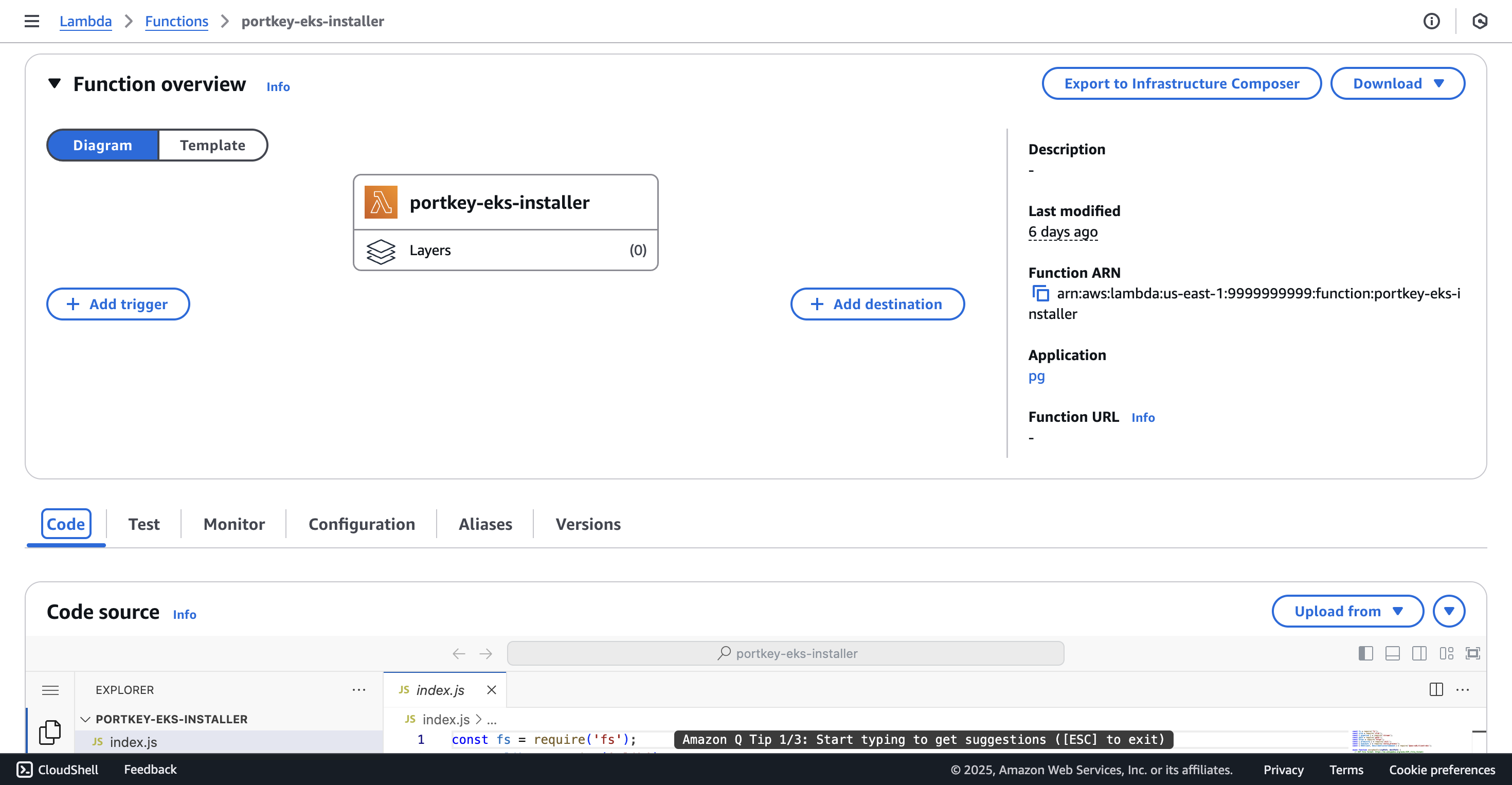
Steps
- Sets up required binaries - Downloads and configures AWS CLI, kubectl, and Helm binaries in the Lambda environment to enable interaction with AWS services and Kubernetes.
- Configures AWS credentials - Creates temporary AWS credential files in the Lambda environment to authenticate with AWS services.
- Connects to EKS cluster - Updates the kubeconfig file to establish a connection with the specified Amazon EKS cluster.
- Manages Helm chart deployment - Adds the Portkey AI Helm repository and deploys/upgrades the Portkey AI Gateway using Helm charts.
- Handles configuration values - Creates a values.yaml file with environment-specific configurations and stores it in an S3 bucket for future reference or updates.
- Provides idempotent deployment - Checks for existing configurations in S3 and uses them if available, allowing the function to be run multiple times for updates without losing custom configurations.
portkey-hybrid-eks-cloudformation.lambda.js
Copy
Ask AI
const fs = require('fs');
const zlib = require('zlib');
const { pipeline } = require('stream');
const path = require('path');
const https = require('https');
const { promisify } = require('util');
const { execSync } = require('child_process');
const { EKSClient, DescribeClusterCommand } = require('@aws-sdk/client-eks');
async function unzipAwsCli(zipPath, destPath) {
// ZIP file format: https://en.wikipedia.org/wiki/ZIP_(file_format)
const data = fs.readFileSync(zipPath);
let offset = 0;
// Find end of central directory record
const EOCD_SIGNATURE = 0x06054b50;
for (let i = data.length - 22; i >= 0; i--) {
if (data.readUInt32LE(i) === EOCD_SIGNATURE) {
offset = i;
break;
}
}
// Read central directory info
const numEntries = data.readUInt16LE(offset + 10);
let centralDirOffset = data.readUInt32LE(offset + 16);
// Process each file
for (let i = 0; i < numEntries; i++) {
// Read central directory header
const signature = data.readUInt32LE(centralDirOffset);
if (signature !== 0x02014b50) {
throw new Error('Invalid central directory header');
}
const fileNameLength = data.readUInt16LE(centralDirOffset + 28);
const extraFieldLength = data.readUInt16LE(centralDirOffset + 30);
const fileCommentLength = data.readUInt16LE(centralDirOffset + 32);
const localHeaderOffset = data.readUInt32LE(centralDirOffset + 42);
// Get filename
const fileName = data.slice(
centralDirOffset + 46,
centralDirOffset + 46 + fileNameLength
).toString();
// Read local file header
const localSignature = data.readUInt32LE(localHeaderOffset);
if (localSignature !== 0x04034b50) {
throw new Error('Invalid local file header');
}
const localFileNameLength = data.readUInt16LE(localHeaderOffset + 26);
const localExtraFieldLength = data.readUInt16LE(localHeaderOffset + 28);
// Get file data
const fileDataOffset = localHeaderOffset + 30 + localFileNameLength + localExtraFieldLength;
const compressedSize = data.readUInt32LE(centralDirOffset + 20);
const uncompressedSize = data.readUInt32LE(centralDirOffset + 24);
const compressionMethod = data.readUInt16LE(centralDirOffset + 10);
// Create directory if needed
const fullPath = path.join(destPath, fileName);
const directory = path.dirname(fullPath);
if (!fs.existsSync(directory)) {
fs.mkdirSync(directory, { recursive: true });
}
// Extract file
if (!fileName.endsWith('/')) { // Skip directories
const fileData = data.slice(fileDataOffset, fileDataOffset + compressedSize);
if (compressionMethod === 0) { // Stored (no compression)
fs.writeFileSync(fullPath, fileData);
} else if (compressionMethod === 8) { // Deflate
const inflated = require('zlib').inflateRawSync(fileData);
fs.writeFileSync(fullPath, inflated);
} else {
throw new Error(`Unsupported compression method: ${compressionMethod}`);
}
}
// Move to next entry
centralDirOffset += 46 + fileNameLength + extraFieldLength + fileCommentLength;
}
}
async function extractTarGz(source, destination) {
// First, let's decompress the .gz file
const gunzip = promisify(zlib.gunzip);
console.log('Reading source file...');
const compressedData = fs.readFileSync(source);
console.log('Decompressing...');
const tarData = await gunzip(compressedData);
// Now we have the raw tar data
// Tar files are made up of 512-byte blocks
let position = 0;
while (position < tarData.length) {
// Read header block
const header = tarData.slice(position, position + 512);
position += 512;
// Get filename from header (first 100 bytes)
const filename = header.slice(0, 100)
.toString('utf8')
.replace(/\0/g, '')
.trim();
if (!filename) break; // End of tar
// Get file size from header (bytes 124-136)
const sizeStr = header.slice(124, 136)
.toString('utf8')
.replace(/\0/g, '')
.trim();
const size = parseInt(sizeStr, 8); // Size is in octal
console.log(`Found file: ${filename} (${size} bytes)`);
if (filename === 'linux-amd64/helm') {
console.log('Found helm binary, extracting...');
// Extract the file content
const content = tarData.slice(position, position + size);
// Write to destination
const outputPath = path.join(destination, 'helm');
fs.writeFileSync(outputPath, content);
console.log(`Helm binary extracted to: ${outputPath}`);
return; // We found what we needed
}
// Move to next file
position += size;
// Move to next 512-byte boundary
position += (512 - (size % 512)) % 512;
}
throw new Error('Helm binary not found in archive');
}
async function downloadFile(url, dest) {
return new Promise((resolve, reject) => {
const file = fs.createWriteStream(dest);
https.get(url, (response) => {
response.pipe(file);
file.on('finish', () => {
file.close();
resolve();
});
}).on('error', reject);
});
}
async function setupBinaries() {
const { STSClient, GetCallerIdentityCommand, AssumeRoleCommand } = require("@aws-sdk/client-sts");
const { SignatureV4 } = require("@aws-sdk/signature-v4");
const { defaultProvider } = require("@aws-sdk/credential-provider-node");
const crypto = require('crypto');
const tmpDir = '/tmp/bin';
if (!fs.existsSync(tmpDir)) {
fs.mkdirSync(tmpDir, { recursive: true });
}
// Download and setup AWS CLI
console.log('Setting up AWS CLI...');
const awsCliUrl = 'https://awscli.amazonaws.com/awscli-exe-linux-x86_64.zip';
const awsZipPath = `${tmpDir}/awscliv2.zip`;
await downloadFile(awsCliUrl, awsZipPath);
// Extract using our custom unzip function
await unzipAwsCli(awsZipPath, tmpDir);
execSync(`chmod +x ${tmpDir}/aws/install ${tmpDir}/aws/dist/aws`);
// Install AWS CLI
execSync(`${tmpDir}/aws/install --update --install-dir /tmp/aws-cli --bin-dir /tmp/aws-bin`, { stdio: 'inherit' });
// Download and setup kubectl
try {
// Download kubectl binary using Node.js https
await new Promise((resolve, reject) => {
const https = require('https');
const fs = require('fs');
const file = fs.createWriteStream('/tmp/kubectl');
const request = https.get('https://dl.k8s.io/release/v1.32.1/bin/linux/amd64/kubectl', response => {
if (response.statusCode === 302 || response.statusCode === 301) {
https.get(response.headers.location, redirectResponse => {
redirectResponse.pipe(file);
file.on('finish', () => {
file.close();
resolve();
});
}).on('error', err => {
fs.unlink('/tmp/kubectl', () => {});
reject(err);
});
return;
}
response.pipe(file);
file.on('finish', () => {
file.close();
resolve();
});
});
request.on('error', err => {
fs.unlink('/tmp/kubectl', () => {});
reject(err);
});
});
execSync('chmod +x /tmp/kubectl', {
stdio: 'inherit'
});
} catch (error) {
console.error('Error installing kubectl:', error);
throw error;
}
console.log('Setting up helm...');
const helmUrl = 'https://get.helm.sh/helm-v3.12.0-linux-amd64.tar.gz';
const helmTarPath = `${tmpDir}/helm.tar.gz`;
await downloadFile(helmUrl, helmTarPath);
await extractTarGz(helmTarPath, tmpDir);
execSync(`chmod +x ${tmpDir}/helm`);
fs.unlinkSync(helmTarPath);
process.env.PATH = `${tmpDir}:${process.env.PATH}`;
execSync(`/tmp/aws-bin/aws --version`);
}
exports.handler = async (event, context) => {
try {
const { CLUSTER_NAME, NODE_GROUP_NAME, CLUSTER_ARN, CHART_VERSION,
PORTKEY_AWS_REGION, PORTKEY_AWS_ACCOUNT_ID, PORTKEYAM_ROLE_ARN,
PORTKEY_DOCKER_USERNAME, PORTKEY_DOCKER_PASSWORD,
PORTKEY_CLIENT_AUTH, ORGANISATIONS_TO_SYNC } = process.env;
console.log(process.env)
if (!CLUSTER_NAME || !PORTKEY_AWS_REGION || !CHART_VERSION ||
!PORTKEY_AWS_ACCOUNT_ID || !PORTKEYAM_ROLE_ARN) {
throw new Error('Missing one or more required environment variables.');
}
await setupBinaries();
const awsCredentialsDir = '/tmp/.aws';
if (!fs.existsSync(awsCredentialsDir)) {
fs.mkdirSync(awsCredentialsDir, { recursive: true });
}
// Write AWS credentials file
const credentialsContent = `[default]
aws_access_key_id = ${process.env.AWS_ACCESS_KEY_ID}
aws_secret_access_key = ${process.env.AWS_SECRET_ACCESS_KEY}
aws_session_token = ${process.env.AWS_SESSION_TOKEN}
region = ${process.env.PORTKEY_AWS_REGION}
`;
fs.writeFileSync(`${awsCredentialsDir}/credentials`, credentialsContent);
// Write AWS config file
const configContent = `[default]
region = ${process.env.PORTKEY_AWS_REGION}
output = json
`;
fs.writeFileSync(`${awsCredentialsDir}/config`, configContent);
// Set AWS config environment variables
process.env.AWS_CONFIG_FILE = `${awsCredentialsDir}/config`;
process.env.AWS_SHARED_CREDENTIALS_FILE = `${awsCredentialsDir}/credentials`;
// Define kubeconfig path
const kubeconfigDir = `/tmp/${CLUSTER_NAME.trim()}`;
const kubeconfigPath = path.join(kubeconfigDir, 'config');
// Create the directory if it doesn't exist
if (!fs.existsSync(kubeconfigDir)) {
fs.mkdirSync(kubeconfigDir, { recursive: true });
}
console.log(`Updating kubeconfig for cluster: ${CLUSTER_NAME}`);
execSync(`/tmp/aws-bin/aws eks update-kubeconfig --name ${process.env.CLUSTER_NAME} --region ${process.env.PORTKEY_AWS_REGION} --kubeconfig ${kubeconfigPath}`, {
stdio: 'inherit',
env: {
...process.env,
HOME: '/tmp',
AWS_CONFIG_FILE: `${awsCredentialsDir}/config`,
AWS_SHARED_CREDENTIALS_FILE: `${awsCredentialsDir}/credentials`
}
});
// Set KUBECONFIG environment variable
process.env.KUBECONFIG = kubeconfigPath;
let kubeconfig = fs.readFileSync(kubeconfigPath, 'utf8');
// Replace the command line to use full path
kubeconfig = kubeconfig.replace(
'command: aws',
'command: /tmp/aws-bin/aws'
);
fs.writeFileSync(kubeconfigPath, kubeconfig);
// Setup Helm repository
console.log('Setting up Helm repository...');
await new Promise((resolve, reject) => {
try {
execSync(`helm repo add portkey-ai https://portkey-ai.github.io/helm`, {
stdio: 'inherit',
env: { ...process.env, HOME: '/tmp' }
});
resolve();
} catch (error) {
reject(error);
}
});
await new Promise((resolve, reject) => {
try {
execSync(`helm repo update`, {
stdio: 'inherit',
env: { ...process.env, HOME: '/tmp' }
});
resolve();
} catch (error) {
reject(error);
}
});
// Create values.yaml
const valuesYAML = `
replicaCount: 1
images:
gatewayImage:
repository: "docker.io/portkeyai/gateway_enterprise"
pullPolicy: IfNotPresent
tag: "1.9.0"
dataserviceImage:
repository: "docker.io/portkeyai/data-service"
pullPolicy: IfNotPresent
tag: "1.0.2"
imagePullSecrets: [portkeyenterpriseregistrycredentials]
nameOverride: ""
fullnameOverride: ""
imageCredentials:
- name: portkeyenterpriseregistrycredentials
create: true
registry: https://index.docker.io/v1/
username: ${PORTKEY_DOCKER_USERNAME}
password: ${PORTKEY_DOCKER_PASSWORD}
useVaultInjection: false
environment:
create: true
secret: true
data:
SERVICE_NAME: portkeyenterprise
PORT: "8787"
LOG_STORE: s3_assume
LOG_STORE_REGION: ${PORTKEY_AWS_REGION}
AWS_ROLE_ARN: ${PORTKEYAM_ROLE_ARN}
LOG_STORE_GENERATIONS_BUCKET: portkey-gateway
ANALYTICS_STORE: control_plane
CACHE_STORE: redis
REDIS_URL: redis://redis:6379
REDIS_TLS_ENABLED: "false"
PORTKEY_CLIENT_AUTH: ${PORTKEY_CLIENT_AUTH}
ORGANISATIONS_TO_SYNC: ${ORGANISATIONS_TO_SYNC}
serviceAccount:
create: true
automount: true
annotations: {}
name: ""
podAnnotations: {}
podLabels: {}
podSecurityContext: {}
securityContext: {}
service:
type: LoadBalancer
port: 8787
targetPort: 8787
protocol: TCP
additionalLabels: {}
annotations: {}
ingress:
enabled: ${PORTKEY_GATEWAY_INGRESS_ENABLED}
className: ""
annotations: {}
hosts:
- host: ${PORTKEY_GATEWAY_INGRESS_SUBDOMAIN}
paths:
- path: /
pathType: ImplementationSpecific
tls: []
resources: {}
livenessProbe:
httpGet:
path: /v1/health
port: 8787
initialDelaySeconds: 30
periodSeconds: 60
timeoutSeconds: 5
failureThreshold: 5
readinessProbe:
httpGet:
path: /v1/health
port: 8787
initialDelaySeconds: 30
periodSeconds: 60
timeoutSeconds: 5
successThreshold: 1
failureThreshold: 5
autoscaling:
enabled: true
minReplicas: 1
maxReplicas: 10
targetCPUUtilizationPercentage: 80
volumes: []
volumeMounts: []
nodeSelector: {}
tolerations: []
affinity: {}
autoRestart: false
dataservice:
name: "dataservice"
enabled: ${PORTKEY_FINE_TUNING_ENABLED}
containerPort: 8081
finetuneBucket: ${PORTKEY_AWS_ACCOUNT_ID}-${PORTKEY_AWS_REGION}-portkey-logs
logexportsBucket: ${PORTKEY_AWS_ACCOUNT_ID}-${PORTKEY_AWS_REGION}-portkey-logs
deployment:
autoRestart: true
replicas: 1
labels: {}
annotations: {}
podSecurityContext: {}
securityContext: {}
resources: {}
startupProbe:
httpGet:
path: /health
port: 8081
initialDelaySeconds: 60
failureThreshold: 3
periodSeconds: 10
timeoutSeconds: 1
livenessProbe:
httpGet:
path: /health
port: 8081
failureThreshold: 3
periodSeconds: 10
timeoutSeconds: 1
readinessProbe:
httpGet:
path: /health
port: 8081
failureThreshold: 3
periodSeconds: 10
timeoutSeconds: 1
extraContainerConfig: {}
nodeSelector: {}
tolerations: []
affinity: {}
volumes: []
volumeMounts: []
service:
type: ClusterIP
port: 8081
labels: {}
annotations: {}
loadBalancerSourceRanges: []
loadBalancerIP: ""
serviceAccount:
create: true
name: ""
labels: {}
annotations: {}
autoscaling:
enabled: false
createHpa: false
minReplicas: 1
maxReplicas: 5
targetCPUUtilizationPercentage: 80`
// Write values.yaml
const valuesYamlPath = '/tmp/values.yaml';
fs.writeFileSync(valuesYamlPath, valuesYAML);
const { S3Client, PutObjectCommand, GetObjectCommand } = require("@aws-sdk/client-s3");
const s3Client = new S3Client({ region: process.env.PORTKEY_AWS_REGION });
try {
const response = await s3Client.send(new GetObjectCommand({
Bucket: `${process.env.PORTKEY_AWS_ACCOUNT_ID}-${process.env.PORTKEY_AWS_REGION}-portkey-logs`,
Key: 'values.yaml'
}));
const existingValuesYAML = await response.Body.transformToString();
console.log('Found existing values.yaml in S3, using it instead of default');
fs.writeFileSync(valuesYamlPath, existingValuesYAML);
} catch (error) {
if (error.name === 'NoSuchKey') {
// Upload the default values.yaml to S3
await s3Client.send(new PutObjectCommand({
Bucket: `${process.env.PORTKEY_AWS_ACCOUNT_ID}-${process.env.PORTKEY_AWS_REGION}-portkey-logs`,
Key: 'values.yaml',
Body: valuesYAML,
ContentType: 'text/yaml'
}));
console.log('Default values.yaml written to S3 bucket');
} else {
throw error;
}
}
// Install/upgrade Helm chart
console.log('Installing helm chart...');
await new Promise((resolve, reject) => {
try {
execSync(`helm upgrade --install portkey-ai portkey-ai/gateway -f ${valuesYamlPath} -n portkeyai --create-namespace --kube-context ${process.env.CLUSTER_ARN} --kubeconfig ${kubeconfigPath}`, {
stdio: 'inherit',
env: {
...process.env,
HOME: '/tmp',
PATH: `/tmp/aws-bin:${process.env.PATH}`
}
});
resolve();
} catch (error) {
reject(error);
}
});
return {
statusCode: 200,
body: JSON.stringify({
message: 'EKS installation and helm chart deployment completed successfully',
event: event
})
};
} catch (error) {
console.error('Error:', error);
return {
statusCode: 500,
body: JSON.stringify({
message: 'Error during EKS installation and helm chart deployment',
error: error.message
})
};
}
};
Post Deployment Verification
Verify Portkey AI Deployment
Copy
Ask AI
kubectl get all -n portkeyai

Verify Portkey AI Gateway Endpoint
Copy
Ask AI
export POD_NAME=$(kubectl get pods -n portkeyai -l app.kubernetes.io/name=gateway -o jsonpath="{.items[0].metadata.name}")
kubectl port-forward $POD_NAME 8787:8787 -n portkeyai
Server is healthy


